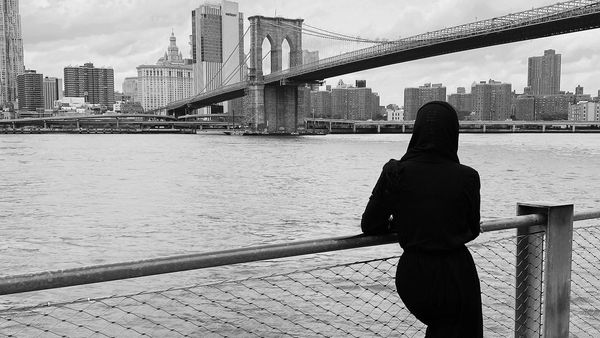Eye For Film >> Movies >> An American Prayer (2021) Film Review
An American Prayer
Reviewed by: Amber Wilkinson

Bookended by his own, intensely personal, observations about his migrant journey from India to the US in search of the American Dream and the way that contradicted what he found, Nusrat Durrani's documentary opens out into a wider consideration of ingrained prejudice in American society.
Beginning with the tone of an essay film, which in tribute to African-American activist Vincent Harding, repeatedly asks "Is America possible? If so, when?", the film offers testimony from people from a variety of cities and cultural backgrounds, each contributor, in their own way a campaigner for equality, whether it is on a political level or simply within the confines of their family.
As people, including Oglala Lakota and Chicano writer Simon Moya-Smith, from Denver, who aims to bring indigenous American stories and struggles to a wider audience and white former US Airforce drone technician Cian Westmoreland, who now works in Tijuana, Mexico, with refugees, asylum seekers and deported veterans outline their disparate - and often disheartening - experiences, their opinions are intercut with archive footage that emphasises the historic and ongoing 'othering' and stereotyping of non-white (and even to a degree white) racial groups.
Durrani covers a lot of ground with determination. His wide-ranging film also zeroes in on, via the contribution of Brooklyn-based Paralympian Garrison Redd, the discrimination faced by disabled people, which Redd explains as doubled down on him because of his African-American heritage, while Lexie Robinson, from Greenwich, Connecticut, highlights the way that people, for example, from Hispanic backgrounds have a tendency to be treated as a monolith rather than a multifaceted diaspora. Meanwhile poet Adeeba Shaheed Talukder highlights the explosion in Islamophobia post 9/11 and Trammy Anh, the daughter of "Vietnamese boat people", talks of her personal battle to bring the black lives matter message to her own family. The next generation, meanwhile, is represented by youngsters Liam and Rowan Kilkenny, who talk about Wolfland, a complex place stemming from their imagination, which offers them refuge.
There's a lot going on here and, in terms of the various stylistic flourishes used, including switching to monochrome and other filters, less would be more. Durrani should have a little more faith in his contributors himself - as their testimony is powerful in its simplicity and doesn't need all the complicated overlay, particularly from the music which tries to underline everything in case we don't realise It Is Important. There's also the fear that Durrani may end up reciting his prayer to the choir to a degree, with those liable to see this likely to already be on board with many of the arguments - though its mainstream packaging could help it travel from big screen to television in the fullness of time.
If the arguments made here are sometimes quite sprawling, as the interviewees move on to talk about their hopes for the America of the future, themes do emerge. Among them is the importance of parents, the deep feeling of loss when a loved one moves away and the desire for self-determination and helping others. Beyond that there's the sense that though all of us may only be able to pull at certain levers in our lives to effect change, we should take heart, perhaps, that so many of us are pulling in the same direction.
Reviewed on: 24 Nov 2021














